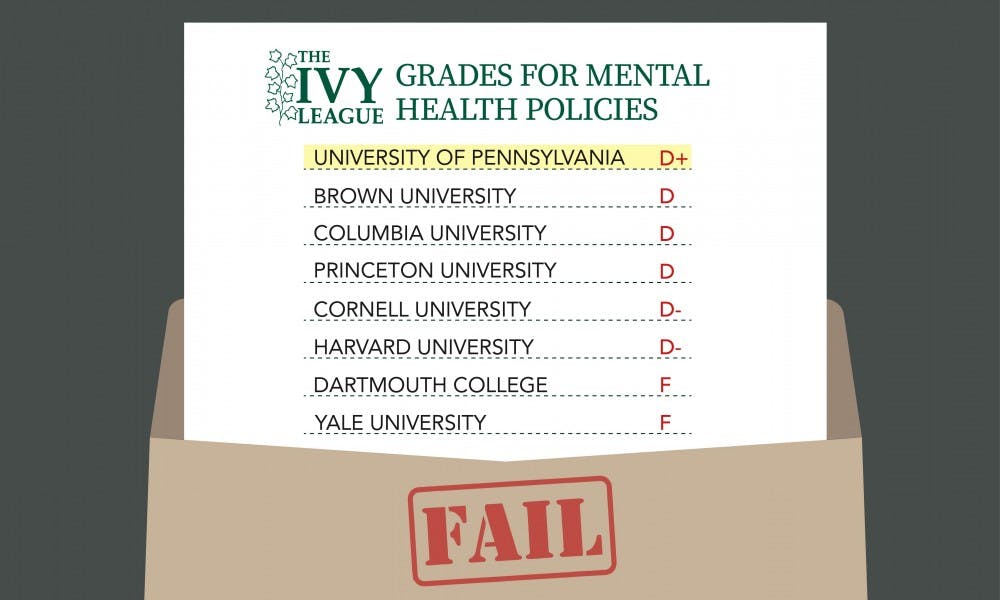
Penn scored the highest in a recent mental health report out of all eight Ivy League schools — with a failing grade of a D+.
The report, conducted by the Ruderman Family Foundation in December, scrutinizes the policies surrounding leaves of absence across the Ivy League, particularly how universities sometimes force students with mental illnesses to take leaves of absence. None of the eight colleges received a passing grade. Yale University and Dartmouth College both received F's, putting them at the bottom of the list.
The foundation's Senior Program Officer Miriam Heyman, who wrote the paper, argued that, while a leave can be beneficial for students, it can also be used by Ivy League universities to unfairly discriminate against students.
Heyman wrote in her report that Penn has policies that include “community disruption” as grounds for making a student take an involuntary leave. She also argues that Penn does not adequately notify students that they are entitled to alternative options, such as reducing course load or receiving assignment extensions.
"The University has no comment on the report," Chief Wellness Officer Benoit Dubé wrote in an email to The Daily Pennsylvanian. "Leaves are unique academic matters overseen by the student’s school, in collaboration with many campus partners.”
At Penn, approximately five percent of undergraduate students take a leave of absence for various reasons, including health concerns, pre-professional opportunities, and family needs, according to the University website.
The report also states that mandating a minimum length of time for a leave of absence is harmful to students.
"The trajectory of mental illness and treatment varies from one person to the next, and the student should be allowed to return whenever he or she is ready," the report read.
In 2015, the DP released an in-depth look into how students managed taking a leave for mental health reasons and found the process of returning back to campus significantly harder.
Melissa Song, College junior and co-director of peer counseling group Penn Benjamins, said she was aware of instances when the University has put pressure on students to take a leave of absence.
"It should be the students’ own volition whether they take a leave of absence" Song said. "If the student wants to stay, then the school has an obligation to take care of that student and do whatever is necessary to keep them happy during their time at Penn."
“For the school to step in and take away that agency can be extremely detrimental to students and loved ones,” she added.
According to University policy, “students whose psychiatric, psychological, or other medical condition causes them to pose a threat to themselves or others, or causes them to significantly disrupt the educational and other activities of the University community, may be required to take a leave of absence from the University.”
Universities may want to force students struggling with mental health to take a leave of absence for several reasons, Heyman wrote, including the fear that the school might receive negative media coverage and the possibility of being found legally responsible for students who die by suicide.
Students have raised concerns related to leave of absence policies in recent years.
In 2017, Penn saw significant dialogue about mental health, following the deaths of seven students. The University responded to pushback from students by organizing a Campus Conversation series. Just this month, Penn announced that a new executive director of Counseling and Psychological Services had been hired, as the school aims to decrease waiting times "between a first consultation and a first counseling appointment."
"I think the Ivy League schools are leaders of the sector of higher education, so I hope they see this as an opportunity for leadership," Heyman said. "They all have a lot of room to improve and I hope that if they take steps to address some of the issues that our papers identify, other schools will follow."
The Daily Pennsylvanian is an independent, student-run newspaper. Please consider making a donation to support the coverage that shapes the University. Your generosity ensures a future of strong journalism at Penn.
Donate






